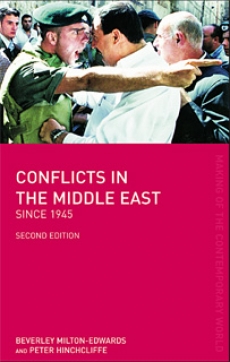 Conflicts in the Middle East since 1945
One fundamental question should be asked of many contemporary accounts of the history and politics of the Middle East in the latter half of the twentieth century. Why does so much analysis of the region take as read that the Middle East, unlike most other regions of the globe, is characterized by a Hobbesian state of nature where war and conflicts are inevitable and endemic? This book sets out to address this perception through examining a series of examples by way of a variety of factors and conditions which have given rise to war and conflicts.
Rather than comparing the region with others with a similar history of conflict such as Africa or Latin America, we have kept our focus on the Middle East. Suffice it to say that conflict ridden though this area has been since the Second World War, its history of confrontation and instability is arguably little different than war-torn western and central Africa or the former Yugoslavia. Its also worth recalling that much of the genesis of conflicts in the region has arisen from the same factors such as the legacy of colonialism and superpower rivalry, as in other parts of the globe. Nevertheless, the dominant perception in the West fed by prejudicial images of bloodthirsty Arabs pitted against their enemies or fighting amongst themselves demands an explanation. We have sought to find one in this book without, from the outset, accepting Hobbesian assumptions but seeking instead to find a less ‘Orientalist’ and more rational explanation for the presence of conflicts within the region... Contents
List of maps / x
Preface / xi
Acknowledgements / xiii
Chronology / xiv
Introduction / 1
1 The Arab–Israeli conflict: ways of war / 8
2 The Palestinian–Israeli conflict: hostages to history / 22
3 Superpower conflict in the Middle East: war by proxy / 36
4 Generation jihad: conflict in the name of Islam? / 49
5 Sectarian conflict: Lebanon, state without a nation / 60
6 Ethnic conflict: the forgotten Kurds / 72
7 War in the Gulf: Iran and Iraq 1980–1989 / 84
8 The Kuwait crisis: brother versus brother / 95
9 The politics of conflict and failure of peacemaking / 106
10 After the storm / 118
Glossary / 130
Notes / 134
Bibliography / 144
Index / 147 Ethnic conflict: The forgotten Kurds
Under the banner of Arab nationalism and other unitary ideologies, ethnicbased claims to political and other rights in the Middle East have been suppressed. As a result, as the Kurdish question illustrates, ethnic conflict is a very real issue in the post-world wars era. The arbitrary nature of state creation following the collapse of the Ottoman Empire and the emergence of regimes striving to consolidate and maintain their authority within highly artificial borders has forced issues of ethnic identity underground without eradicating them. It has been the response by states to the pressures imposed by a growing ethnic and national consciousness amongst the Kurdish people that has brought about episodes of sustained conflict within three countries in the region.
The Kurds, who number at least 26 million, are, after the Arabs, the largest ethnic group in the near and Middle East. About 90 per cent of the total Kurdish population world-wide live within the boundaries of one Arab country (Iraq) and two non-Arab states (Turkey and Iran). The remainder are found in Syria (about one million), the former Soviet Union (half a million) with 700,000 living in a wider diaspora. Despite their numbers the Kurds have consistently been denied the right to statehood and have been a persecuted minority in the region. Kurdish demands for self-determination have for nearly a century led to conflict, particularly in Iraq, Iran and Turkey. The conflict has been both horizontal and vertical in dimension; within the Kurdish communities and between the Kurds and the state. Additionally individual states have exploited Kurdish ambitions in order to promote tension or conflict with their neighbours. With increasingly little hope of establishing statehood or achieving secession from any of the states within the region they have encountered armed repression in response to their attempts to obtain formal recognition of their claims for political and civil rights. The states’ response to such demands, particularly in Turkey and Iraq, has resulted in policies of enforced population transfer at one end of the scale of state-organized oppression to ethnic cleansing and wholesale massacre at the other. In this chapter we will examine why this is so and look at the prospects for the Kurds in the opening decades of the third millennium... Conflicts in the Middle East
since 1945
Beverly Milton-Edwards & Peter Hinchcliffe
Routledge
First published 2001
Second edition first published 2004
by Routledge
11 New Fetter Lane, London EC4P 4EE
Simultaneously published in the USA and Canada
by Routledge
29 West 35th Street, New York, NY 10001
Routledge is an imprint of the Taylor & Francis Group
© 2001, 2004 Beverley Milton-Edwards and Peter Hinchcliffe
All rights reserved. No part of this book may be reprinted or
reproduced or utilised in any form or by any electronic,
mechanical, or other means, now known or hereafter
invented, including photocopying and recording, or in any
information storage or retrieval system, without permission in
writing from the publishers.
British Library Cataloguing in Publication Data
A catalogue record for this book is available from the British Library
Library of Congress Cataloging in Publication Data
Milton-Edwards, Beverley.
Conflicts in the Middle East since 1945 / Beverley Milton-Edwards and
Peter Hinchcliffe.—2nd ed.
p. cm.—(Making of the contemporary world)
Includes bibliographical references and index.
1. Middle East—Politics and government—1945– 2. Mediation,
International. I. Hinchcliffe, Peter, 1937– II. Title. III. Series.
DS63.1.M566 2003
956.04—dc21 2003012408
ISBN 0–415–31786–X (hbk)
ISBN 0–415–31787–8 (pbk)
This edition published in the Taylor & Francis e-Library, 2004.
ISBN 0-203-59446-0 Master e-book ISBN
ISBN 0-203-34012-4 (Adobe eReader Format)

PDF
Destûra daxistina; vê berhêmê nîne.
|